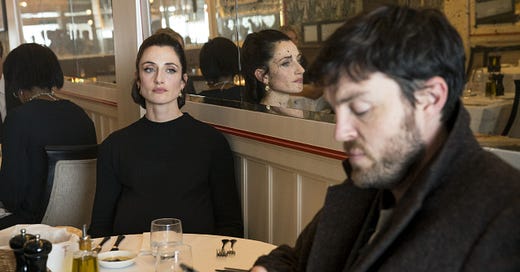The Strange Death of Charlotte Campbell
Could the Psycho-Ex be the Focus of a Murder Investigation in Strike 8?
In the literary world crafted by Robert Galbraith, readers are accustomed to intricate plots, complex characters, and mysteries that keep them on the edge of their seats. One such enigma unfolds in The Running Grave, where the death of Charlotte Campbell raises, for me, more questions than answers. While the official verdict may be suicide, a closer examination of the details surrounding her demise suggests that Charlotte's fate is more likely the result of foul play.
Charlotte Campbell was Murdered!
Strike's reputation as a skilled investigator precedes him, and he seems to specialize in probing suspicious suicides. Even in the SIB, he had come across murders disguised as other things:
“In his professional capacity he had viewed bodies that had been dragged into positions intended to suggest suicide or accident” The Silkworm Ch17
I find it hard to believe that, just because Charlotte had a history of attempting suicide, Strike would so readily accept self-harm as the cause of her demise so soon after her physical confrontation with Landon Dormer.
Chiastic Structure of the Series
John Granger has demonstrated that the seven book series so far forms a chiastic structure with a book one to book seven latch and a book four turn, reflecting both books one and seven. In Cuckoo’s Calling and Lethal White we had the principle mystery being a murder disguised as a suicide. A suicide investigation in book 7, possibly Leda’s, was predicted back in 2018 by our Headmaster. Until The Running Grave, genuine, successful suicides are thin on the ground, with the murders of Lula Landry, Rochelle Onifade and Jasper Chiswell all believed to have been suicides by the police. The detective’s investigations proved otherwise. Off stage we have Leda Strike’s apparent overdose, strongly suspected by Cormoran to be murder.
“She died of an overdose and they said it was suicide, but Stick always thought her ex-husband did it.” The Cuckoo’s Calling Part 3 Ch10
There is a hitch in the structural symmetry of the Strike series. If the first seven books are a closed set as John has established, how do the last three books connect to that ring? Evan Willis has argued that a Tetractys pyramid of sorts is a good bet. Charlotte’s seeming suicide suggests another possibility.
If the murder of Charlotte Campbell is the closing latch to the seven-book cycle, its investigation could be the book eight opening latch, leading into the book ten closer with the investigation into Leda Strike’s death. Murders-that seem-to-be-suicides in books 1/4/7/10 with the latch between the 1-7 cycle and 8-10 cycle being the murder and then investigation into Charlotte’s death potentially resolves the seeming disconnect between the first seven and last three books.
Capulet at the Close
Moving beyond structure, the case that Charlotte was murdered moves to literary allusion for its next supporting reason. In the statement he gave to the press, Charlotte’s brother Sacha quotes Lord Capulet, from the very end of Romeo and Juliet, on discovering Juliet’s dead body:
‘We’ve lost the funniest, cleverest, most original woman any of us knew,’ said Campbell’s half-brother, actor Sacha Legard, in a separate statement. ‘I’m just one of the heartbroken people who loved her, struggling to comprehend the fact that we’ll never hear her laugh again. Death lies on her like an untimely frost Upon the sweetest flower of all the field.’ Chapter 64
In the case of Juliet, her undoubted suicide was in no small part caused by the pressures created by Lord Capulet, which in turn forced Juliet to attempt to fake her own death. Could this line indicate some culpability in the brother?
Cormoran’s meets with the shade of Charlotte in St John the Baptist church in Aylmerton. Harry had to decide whether to stay with Dumbledore and go wherever that leads, or return and face his responsibilities, by defeating Voldemort. Strike’s decision is more prosaic, but it still requires facing down some demons of his own.
He wasn’t so different from Lucy, after all. They’d both set out to refashion their worlds, they’d just done it in very different ways. If he was lucky, he had half his life to live again, and it was time to give up things far more harmful than smoking and chips, time to admit to himself he should seek something new, as opposed to what was damaging but familiar. Chapter 64
So, pleased as I was with the ghost of Charlotte and Strike’s decision at his Kings Cross experience in Aylmerton, I did half expect her to play Hamlet’s father with her ex there, crying foul murder and calling for retribution. The invocation of Lord Capulet’s speech at the end of Romeo and Juliet, however, by her half-brother suggests strongly that someone was culpable in Charlotte’s death beside Strike.
Amelia Crichton
In both Lula and Jasper’s case it was a family member who insisted Strike investigate, so I was pleased, believing as I did that Charlotte’s death was at least suspicious, that her sister Amelia called Strike immediately after her death was announced to the press. Her name suggested she would ask Strike to investigate.
‘Amelia’ is an English-language variant of ‘Amalia,’ derived from the Hebrew word amal meaning 'work', and connoting industriousness and fertility. She certainly seems more down-to-earth and business-like than her sister. She works as an interior decorator in her own shop in Belgravia, a very upper and upper middle-class area of London.
‘Crichton’ derives from ‘Creighton,’ a traditional surname, meaning “border, boundary settlement” or “from the hilltop town.” Readers may remember J. M. Barrie’s play The Admirable Crichton, where the titular Crichton, a butler, demonstrates the artificiality of British Class structure when he and his employers are shipwrecked on a desert island and he becomes the leader of the marooned group. Amelia, a privileged person with premises in Belgravia, may seem a strange analogue for the admirable Crichton, being from the top of the traditional class structure (her husband is an ex-member of the Blues and Royals, that most aristocratic of cavalry regiments), but she does seem the most capable and competent of the Campbell clan.
When they finally met in chapter 135, not only did Amelia not ask Strike to investigate, but she also didn’t even tell him what the suicide note contained (a piece of evidence that is now destroyed). I confess to being so blindsided by this, both her silence and his acceptance of her seeming indifference, I had to immediately re-read the chapter to confirm I hadn’t missed anything. Arguing from a failure to act in keeping with the series’ precedents and with what her cratylic name suggests about Amelia’s character, the absence of suspicion about Charlotte’s supposed suicide and her family’s destruction of key evidence raises red flags about the seeming death by self-harm to once again have been actually a homicide.
Charlotte is an Unresolved Character
Moving from cryptonyms to story threads, the case that Charlotte was murdered seems at least as credible as suicide because of the number and quality of the unresolved questions she left behind her.
At the start of Cuckoo’s Calling, we have angry Charlotte fresh from accusations of faking a pregnancy and subsequent miscarriage. We, as readers still do not know the truth of this. Charlotte told Cormoran in Lethal White that she “took a [pregnancy] test at my mother’s” (ch 50) which gives him a solid place to start his post mortem inquiry.
In The Running Grave Charlotte claims to have been diagnosed with breast cancer and again we do not know if this is true. Strike chooses at book’s end to dismiss the possibility because Amelia did not bring the subject up at their tête-à-tête. But why would she, if she thinks as little of him as he suggests? Why did he choose not to bring it up?
After being briefly introduced as innuendo in The Ink Black Heart, Landon Dormer, billionaire American hotelier, is photographed with Charlotte looking blank and glassy eyed.
Recently separated from her husband, Charlotte was now featuring heavily in gossip columns alongside her new boyfriend, Landon Dormer, a thrice-married, lantern-jawed billionaire American hotelier. Robin’s only thought on seeing the most recent paparazzi pictures of the couple was that Charlotte, though as beautiful as ever in her red slip dress, looked strangely blank and glassy-eyed. Chapter 2
Was she on drugs of her own choice or was she being drugged?
In chapter 59, Strike reads a newspaper story with the headline, “Viscountess Arrested for Assault on Billionaire Boyfriend.” That article does not share what happened in Dormer’s Mayfair house, but there is plenty to unpack in a future investigation. If the Campbell clan or even the Ross’s were hopeful of reviving their fortunes with the billionaire’s largesse, the story of Charlotte’s breaking with the hotelier may provide the motive for her murder. Her repeated requests for a meeting with him may have been her seeking an opportunity to ask his advice about her perilous situation.
Conclusion
I have convinced myself, even if Cormoran for all his experience of faked suicides hasn’t considered this possibility, that Charlotte Campbell was murdered.
The structure of the series suggests fake suicides in books 1-4-7-10 and the murder and investigation of Charlotte’s demise would latch the apparent 1-4-7 cycle to the putative 8-9-10 series close.
Sacha Legard’s invoking Lord Capulet about Juliet’s suicide is a literary allusion which, because that Shakespearean character’s death was a faked suicide as well as as her actually killing herself, points to Charlotte’s suicide being more complicated than it seems and that her family was somehow involved.
The unanswered questions of Charlotte’s recent past and the end of her relationship with Strike are loose threads that need to be resolved if the series is to end in a satisfying manner.
Amelia Crichton (mentioned briefly in every book from Lethal White on) is too good of a character not to see again and her name is suggestive of a practical woman with reason for choosing not to be open with Strike. As in “not letting him see the suicide note” as Charlotte supposedly wanted her to do.
Structure, intertextuality, hanging plot lines, and cryptonym deciphering, then, all point to Charlotte’s suicide not being what it seems.
Am I the only Serious Striker that thinks Charlotte was murdered? Could she turn out to be Snape with her death having been her final sacrifice? Let me know your thoughts in the comments!





These speculations are so interesting! I do agree that we were given an awfully long recap of Charlotte’s family, for a character who is exiting the narrative. And, I’m most intrigued by the connections you make to the death of Juliet, and to your catch of the name Simon. One more reason to eagerly anticipate book eight!
Yes I thought it was SO strange he didn’t read the suicide note. And it seemed obvious she was trying to tell him something. There was so much added to her story right near the end it felt like. Can’t wait to find out. Your theory makes a lot of sense to me.